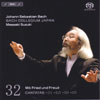Bach Cantatas, Vol 32
. . . and a rival odyssey finds Suzuki at his inspired best
View record and artist detailsRecord and Artist Details
Composer or Director: Johann Sebastian Bach
Genre:
Vocal
Label: BIS
Magazine Review Date: 10/2006
Media Format: Super Audio CD
Media Runtime: 74
Mastering:
Stereo
DDD
Catalogue Number: BIS-SACD1501

Tracks:
| Composition | Artist Credit |
|---|---|
| Cantata No. 111, 'Was mein Gott will, das g'scheh |
Johann Sebastian Bach, Composer
Andreas Weller, Tenor Bach Collegium Japan Johann Sebastian Bach, Composer Masaaki Suzuki, Harpsichord Peter Kooij, Bass Robin Blaze, Countertenor Yukari Nonoshita, Soprano |
| Cantata No. 123, 'Liebster Immanuel, Herzog der Fr |
Johann Sebastian Bach, Composer
Andreas Weller, Tenor Bach Collegium Japan Johann Sebastian Bach, Composer Masaaki Suzuki, Harpsichord Peter Kooij, Bass Robin Blaze, Countertenor |
| Cantata No. 124, 'Meinen Jesum lass ich nicht' |
Johann Sebastian Bach, Composer
Andreas Weller, Tenor Bach Collegium Japan Johann Sebastian Bach, Composer Masaaki Suzuki, Harpsichord Peter Kooij, Bass Robin Blaze, Countertenor Yukari Nonoshita, Soprano |
| Cantata No. 125, 'Mit Fried und Freud ich fahrt da |
Johann Sebastian Bach, Composer
Andreas Weller, Tenor Bach Collegium Japan Johann Sebastian Bach, Composer Masaaki Suzuki, Harpsichord Peter Kooij, Bass Robin Blaze, Countertenor |
Author: Jonathan Freeman-Attwood
Masaaki Suzuki takes us further into the second year of Bach’s post in Leipzig with four fine cantatas which sit at the solar plexus of the second cycle in New Year 1725 – the unfinished series of works whose primary catalyst was the hymn of the week and not the usual gospel reading. The quality and maturity of Bach’s vocal writing is revealed here in works which are still fighting for recognition. No 111 is the exception, with Bach’s taut representation of God’s might and also celebrated for the great duet, “So geh ich mit behertzen Schritten” (“So I go with heartened steps”) which Robin Blaze and Andreas Weller perform with exultant esprit.
Bach Collegium Japan are at their most persuasive in the superficially dour but incrementally magisterial opening choruses of both Nos 125 and 123, the latter a brilliant slow-burn contemplation of faith (and hope) with predominant falling motifs from the tender opening of the hymn. Suzuki paces this with as much warmth and understanding as he does in No 124, where a sweetly running oboe d’amore line threads its way through the galant minuet.
With Mit Fried und Freud we enter into another meditation on death, one in which Suzuki traverses Bach’s extraordinary tonal excursions in the opening chorus, matched only by the succeeding aria where the blind disciple seeks Christ. Robin Blaze is quite exquisite here, as are the poignant oboe and flute obbligati which reflect the fragile human condition in a way strikingly akin to the mysteries and musical language of the St Matthew Passion. Suzuki and his musicians can be content that they have pulled out all the stops for one of Bach’s most mesmerising creations.
Bach Collegium Japan are at their most persuasive in the superficially dour but incrementally magisterial opening choruses of both Nos 125 and 123, the latter a brilliant slow-burn contemplation of faith (and hope) with predominant falling motifs from the tender opening of the hymn. Suzuki paces this with as much warmth and understanding as he does in No 124, where a sweetly running oboe d’amore line threads its way through the galant minuet.
With Mit Fried und Freud we enter into another meditation on death, one in which Suzuki traverses Bach’s extraordinary tonal excursions in the opening chorus, matched only by the succeeding aria where the blind disciple seeks Christ. Robin Blaze is quite exquisite here, as are the poignant oboe and flute obbligati which reflect the fragile human condition in a way strikingly akin to the mysteries and musical language of the St Matthew Passion. Suzuki and his musicians can be content that they have pulled out all the stops for one of Bach’s most mesmerising creations.
Discover the world's largest classical music catalogue with Presto Music.

Gramophone Digital Club
- Digital Edition
- Digital Archive
- Reviews Database
- Full website access
From £8.75 / month
Subscribe
Gramophone Full Club
- Print Edition
- Digital Edition
- Digital Archive
- Reviews Database
- Full website access
From £11.00 / month
Subscribe
If you are a library, university or other organisation that would be interested in an institutional subscription to Gramophone please click here for further information.




